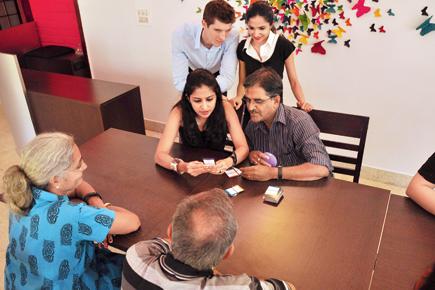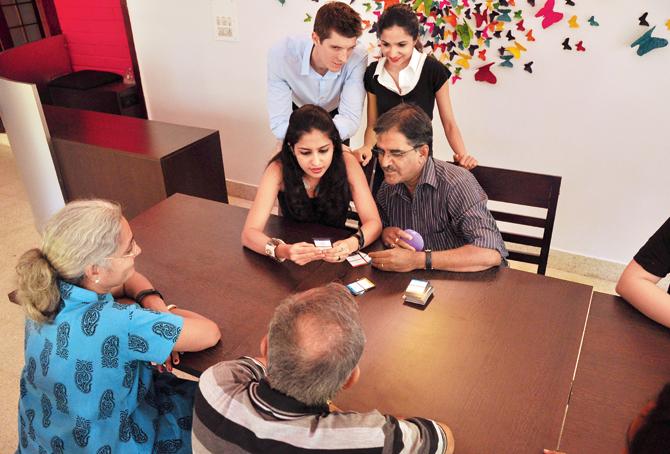Two Cornell University researchers have set up Better Brains, India’s first fitness centre to exercise the brain. As the International Brain Awareness Week concludes today, Kareena Gianani speaks to Dr Nick Ratterman and Dr Krithika Kumar on why a fit brain needs more than performance-enhancing online games

Dr Nick Ratterman and Dr Krithika Kumar (standing) guide participants from different age groups through brain exercise modules at Better Brains, Bengaluru
A few years ago, Dr Krithika Kumar was immersed in research after completing her postdoctoral at the Molecular Biology and Genetics department at Cornell University. She, however, dreamt of a life beyond academia, in Bengaluru, her home town. One day, a conversation with her father took an unexpected turn.
Her father, a dyed-in-the-wool entrepreneur, who launched many successful businesses since his youth, rued about how the elderly in the country have few avenues to go and exercise their mental faculties. He, of course, had a verdant, idyllic expanse — a country club-like space — in mind, but Kumar and her husband, Dr Nick Ratterman, who completed his postdoctoral work in the department of Neurobiology and Behaviour, were piqued at a different possibility.
ADVERTISEMENT

Dr Nick Ratterman and Dr Krithika Kumar (standing) guide participants from different age groups through brain exercise modules at Better Brains, Bengaluru
Last week, the couple launched Better Brains, India’s first brain fitness centre which integrates brain science into immersive, social experiences to help people of all ages exercise their brain for optimal cognitive fitness. Their programmes include neurobics, physical exercises, yoga, meditation and nutritional counselling. The start-up’s website lists increased concentration and memory, better attention and focus and reduced stress as the gym’s immediate benefits. It claims that protection against potential health problems such as Alzheimer’s and other forms of dementia are the long-term benefits of the programmes. Better Brains will begin accepting clients this week.
Dr Kumar and Dr Ratterman say the move from academia to entrepreneurship is both daunting and exciting. So, is Better Brains like the online brain training programmes that have taken the US by storm over the past few years? “We are not only selling a product; we are also selling the concept of cognitive fitness. Computer-based brain games are a part of our programme and there is science to support their effectiveness, but it is not the only activity that needs to be performed to keep your brain healthy. We look at a more holistic, social and multi-pronged approach,” says Dr Ratterman.
An average person is flooded with ample health columns and research on their timelines, exhorting him/her to get out and work their brains or a fuzzy, muddled future beckons. Dr Kumar says this exactly is where the problem lies. “The internet gives you a lot of information, but it is not easy to discern what is based on scientific evidence.
As academics, we value criticism and peer reviews, and this is why we include activities that have been scientifically shown to increase cognitive performance. We performed a systematic review of the scientific literature and collaborated with Dr Elkhonon Goldberg www.elkhonongoldberg.com/) from The Luria Neuroscience Institute (www.lninstitute.org/), as well as other neuropsychologists, psychologists, and education specialists from the United States and abroad.”
Dr Kumar and Dr Ratterman have a centre at Bengaluru where people could become members of this ‘brain gym’ after participating in a brain fitness test to help the doctors establish a baseline score of his/her mental abilities which would later help them chart the client’s progress. “We focus on all cognitive functions. Different areas of the human brain control different functions, and one area can be involved in multiple functions. Exercising it holistically is the key to its overall health, though we also try to pay specific attention to any cognitive function that a client specifically desires (for instance, memory-related issues, poor attention),”explains Dr Ratterman.
Taking care of your brain amid stress and frenetic lifestyles is as difficult as getting to smell flowers on your way to work. The duo says their challenge lies in working around punishing distractions people often work with, increased reliance on technology and very little time to switch off. “Not everybody can throw up their hands, pack up, and move out of cities. We cannot change everyone’s lifestyle, but we can definitely help them function optimally within their given environment,” say Dr Kumar and Dr Ratterman.
Log on to: www. betterbrains.in
 Subscribe today by clicking the link and stay updated with the latest news!" Click here!
Subscribe today by clicking the link and stay updated with the latest news!" Click here!







